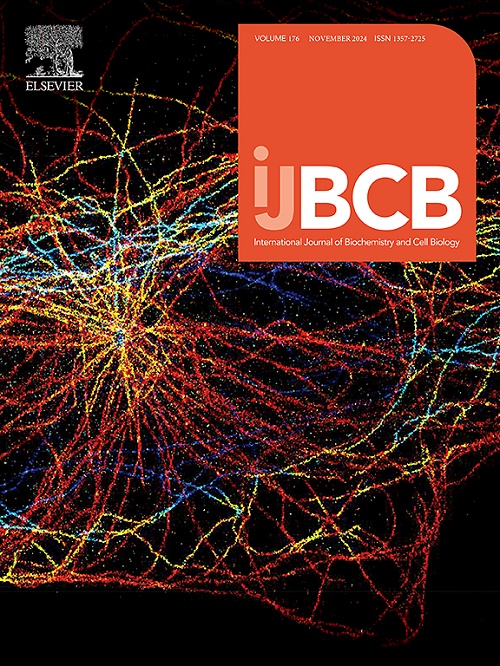Prevention of fenitrothion induced hepatic toxicity by saponarin via modulating TLR4/MYD88, JAK1/STAT3 and NF-κB signaling pathways
IF 3.4
3区 生物学
Q2 BIOCHEMISTRY & MOLECULAR BIOLOGY
International Journal of Biochemistry & Cell Biology
Pub Date : 2025-02-01
DOI:10.1016/j.biocel.2024.106716
引用次数: 0
Abstract
Fenitrothion (FEN) is an organophosphate insecticidal agent that is considered as major source of organs toxicity. Saponarin (SAP) is a naturally occurring novel flavone that exhibits a wide range of medicinal properties. The current trial was conducted to evaluate the ameliorative potential of SAP against FEN instigated liver toxicity in rats. Thirty-two male albino rats were apportioned into four groups including control, FEN (10 mg/kg), FEN (10 mg/kg) + SAP (80 mg/kg), and SAP (80 mg/kg) alone treated group. It was revealed that FEN administration upregulated the gene expression of TNF-α, TLR4, IL-1β, MYD88, IL-6, TRAF6, COX-2, NF-κB, JAK1 and STAT3 while reducing the gene expression of IκB. Moreover, the levels of reactive oxygen species (ROS) and malondialdehyde (MDA) were increased while the activities of catalase (CAT), glutathione peroxidase (GPx), superoxide dismutase (SOD), heme-oxygenase-1 (HO-1) and glutathione reductase (GSR) were decreased after FEN exposure. Furthermore, FEN administration notably escalated the levels of hepatic enzymes including alanine transaminase (ALT), aspartate aminotransferase (AST), gamma-glutamyl transferase (GGT) and alkaline phosphatase (ALP) whereas reduced the levels of total proteins and albumin. Besides, FEN intake upregulated the levels of Caspase-9, Bax and Caspase-3 while reducing the levels of Bcl-2. Hepatic histology was impaired after FEN intoxication. Nonetheless, SAP treatment remarkably protected the normal state of liver via regulating abovementioned irregularities. Our in-silico analysis confirmed that SAP hold that potential to interact with binding pocket of these proteins, highlighting its ability as a therapeutic compound to alleviate FEN-induced liver damage.
皂苷通过调控TLR4/MYD88、JAK1/STAT3和NF-κB信号通路预防菲诺硫磷诱导的肝毒性
杀虫磷(FEN)是一种有机磷杀虫剂,被认为是器官毒性的主要来源。皂苷(Saponarin, SAP)是一种天然存在的新型黄酮,具有巨大的药用价值。目前的试验是为了评估SAP对FEN引起的肝毒性的治疗潜力。将32只雄性褐家鼠分为4组,分别为对照组、FEN (10mg/kg)组、FEN (10mg/kg) + SAP (80mg/kg)组和SAP (80mg/kg)单独处理组。结果表明,FEN可上调TNF-α、TLR4、IL-1β、MYD88、IL-6、TRAF6、COX-2、NF-κB、JAK1和STAT3基因的表达,抑制i -κB基因的表达。此外,添加FEN可提高活性氧(ROS)和丙二醛(MDA)水平,抑制过氧化氢酶(CAT)、谷胱甘肽过氧化物酶(GPx)、超氧化物歧化酶(SOD)、血红素加氧酶-1 (HO-1)和谷胱甘肽还原酶(GSR)活性。此外,FEN显著升高了肝酶的浓度,包括丙氨酸转氨酶(ALT)、天冬氨酸转氨酶(AST)、γ -谷氨酰转氨酶(GGT)和碱性磷酸酶(ALP),同时降低了总蛋白和白蛋白的浓度。此外,FEN摄入上调了Caspase-9、Bax和Caspase-3的水平,降低了Bcl-2的水平。给予FEN后肝脏组织学改变。尽管如此,SAP治疗通过调节上述不规则性显著保护了肝脏的正常状态。我们的计算机计算证实,SAP具有与这些蛋白质结合袋相互作用的潜力,突出了其作为一种治疗性化合物减轻fen诱导的肝损伤的能力。
本文章由计算机程序翻译,如有差异,请以英文原文为准。
求助全文
约1分钟内获得全文
求助全文
来源期刊
CiteScore
8.10
自引率
0.00%
发文量
124
审稿时长
19 days
期刊介绍:
IJBCB publishes original research articles, invited reviews and in-focus articles in all areas of cell and molecular biology and biomedical research.
Topics of interest include, but are not limited to:
-Mechanistic studies of cells, cell organelles, sub-cellular molecular pathways and metabolism
-Novel insights into disease pathogenesis
-Nanotechnology with implication to biological and medical processes
-Genomics and bioinformatics

 求助内容:
求助内容: 应助结果提醒方式:
应助结果提醒方式:


